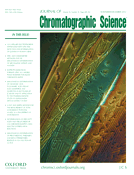
JOURNAL OF CHROMATOGRAPHIC SCIENCE
Scope & Guideline
Advancing the Frontiers of Chromatographic Knowledge
Introduction
Aims and Scopes
- Chromatographic Method Development and Validation:
The journal publishes research on novel and optimized chromatographic methods, including HPLC, GC, and TLC, aimed at enhancing the efficiency, sensitivity, and specificity of analyses. - Application of Chromatography in Pharmacokinetics and Drug Monitoring:
A significant focus is on the application of chromatographic techniques in pharmacokinetic studies and therapeutic drug monitoring, addressing the quantification of drugs and their metabolites in biological matrices. - Environmental and Food Safety Analysis:
Research aimed at the determination of contaminants, pesticides, and residues in food and environmental samples is a core area, highlighting the importance of chromatography in ensuring public health. - Chiral Separations and Enantiomeric Analysis:
The journal frequently features studies on chiral chromatography, focusing on the separation and quantification of enantiomers, which is crucial for pharmaceutical applications. - Green and Sustainable Analytical Chemistry:
A unique contribution of the journal includes the promotion of green chemistry principles in chromatographic methods, emphasizing environmentally friendly practices and reducing chemical waste.
Trending and Emerging
- Integration of Chemometrics with Chromatography:
There is a growing trend in applying chemometric techniques to enhance chromatographic analysis, facilitating better data interpretation and method optimization. - Use of Green Chemistry Principles:
Research focusing on sustainable practices, including the development of eco-friendly solvents and methods, is increasingly prominent, aligning with global efforts towards sustainability in analytical chemistry. - Advanced Chromatographic Techniques:
Emerging methodologies such as ultra-high-performance liquid chromatography (UHPLC) and the use of novel stationary phases are gaining traction, indicating a shift towards more sophisticated analytical capabilities. - Pharmaceutical Applications and Biotechnology:
The journal is seeing an increase in studies related to the analysis of biopharmaceuticals and biologics, reflecting the growing importance of these areas in drug development and quality control. - Multi-Component and Simultaneous Analysis:
There is a notable rise in the publication of studies that focus on the simultaneous analysis of multiple compounds, which is crucial for complex matrices such as biological fluids and environmental samples.
Declining or Waning
- Traditional Chromatographic Techniques:
There is a noticeable decline in the publication of studies solely focused on traditional chromatographic methods without innovative enhancements, as researchers increasingly seek more advanced and efficient techniques. - Non-Analytical Applications of Chromatography:
Research papers that explore non-analytical applications of chromatography, such as basic chemical education or historical perspectives, appear to be waning, as the journal shifts its focus towards practical and impactful applications. - Basic Method Comparisons:
The frequency of papers that primarily compare existing methods without introducing novel insights or improvements has decreased, signaling a trend towards more innovative and application-driven research.
Similar Journals
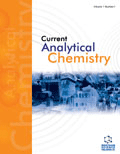
Current Analytical Chemistry
Bridging research and application in analytical chemistry.Current Analytical Chemistry is a pivotal journal in the field of analytical chemistry, published by Bentham Science Publishers Ltd. Established to bridge the gap between fundamental research and practical applications, this journal offers a platform for the dissemination of significant advancements and innovations from the realms of chemical analysis techniques and methodologies. With an impressive scope covering both theoretical and applied analyses, it has successfully secured a Q3 category ranking in the 2023 metrics of Analytical Chemistry, positioned at #75 out of 156 in the Scopus rankings. Researchers, professionals, and students can expect to engage with high-quality content that reflects the latest trends and issues within the discipline. Although it currently does not offer Open Access options, the journal continuously strives to maintain high editorial standards that contribute to its impactful presence in the academic community. The convergence of ideas from 2006 to 2024 promises to uphold its reputation as a reliable source for cutting-edge research in analytical chemistry.
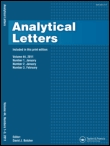
ANALYTICAL LETTERS
Fostering Knowledge in Analytical ResearchANALYTICAL LETTERS is a reputable journal published by Taylor & Francis Inc, focusing on the dynamic fields of analytical chemistry, biochemistry, and clinical biochemistry. With an ISSN of 0003-2719 and an E-ISSN of 1532-236X, the journal has been a platform for scholarly articles since its inception in 1967, and is set to continue its contribution to the scientific community until 2024. Despite its classification in Q3 across various categories as of 2023, including analytical chemistry and spectroscopy, ANALYTICAL LETTERS maintains a significant impact within its field, evidenced by its moderate rankings within Scopus. This journal serves as a vital resource for researchers and professionals seeking to explore recent advancements in analytical methodologies, instrumentation, and applications, facilitating the dissemination of critical insights in laboratory practices. With access primarily through institutional subscriptions, it remains positioned as a crucial tool for those advancing knowledge and innovation in analytical sciences.
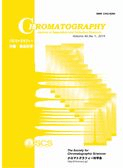
Chromatography
Transforming sample analysis with cutting-edge chromatographic research.Chromatography is an esteemed journal published by the SOC CHROMATOGRAPHIC SCIENCES, dedicated to advancing the field of chromatographic techniques and their applications across various disciplines, including analytical chemistry, biochemistry, and environmental science. By facilitating the exchange of high-quality research, Chromatography plays a pivotal role in enhancing methodologies and technologies that drive innovation in sample analysis. While the journal is not currently open access, it maintains a rigorous peer-review process, ensuring the publication of valuable and impactful studies. Researchers, professionals, and students alike can benefit from its comprehensive coverage of chromatography-related advancements, making it a vital resource for anyone engaged in this dynamic area of study.
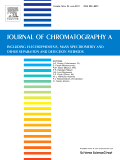
JOURNAL OF CHROMATOGRAPHY A
Fostering Excellence in Analytical ResearchJOURNAL OF CHROMATOGRAPHY A, published by Elsevier, is a leading journal in the disciplines of Analytical Chemistry, Biochemistry, and Organic Chemistry, boasting an impressive 2023 Q2 categorization across multiple fields. With an ISSN of 0021-9673 and an E-ISSN of 1873-3778, this prestigious journal has been at the forefront of chromatography research since its inception in 1958. The journal serves as a vital platform for disseminating high-quality research articles, reviews, and insights into the latest developments in chromatographic techniques and applications, reflecting its standing in the top tier of analytical and organic chemistry literature, evidenced by its impressive Scopus rankings. While it currently operates under a subscription model, the journal continues to make significant contributions to the scientific community by fostering collaboration and innovation in chromatography methodologies. We invite researchers, professionals, and students to engage with the essential findings shared within its pages, which are foundational for advancements in various scientific fields, making it an indispensable resource for enhancing chromatographic knowledge and practice.

ACTA CHROMATOGRAPHICA
Exploring the Depths of Chromatographic ScienceACTA CHROMATOGRAPHICA is a distinguished academic journal dedicated to the field of chromatography and its applications, published by AKADEMIAI KIADO ZRT. With a history spanning from 1996 to 2024, this journal serves as a vital platform for the dissemination of innovative research and advancements within the field, contributing significantly to the body of knowledge in the domain of general chemistry. Operating out of Budapest, Hungary, ACTA CHROMATOGRAPHICA holds a Q3 ranking in the chemistry category as of 2023, reflecting its impact and relevance among its peers, achieving a Scopus ranking of 180 out of 408 in the General Chemistry category, placing it in the 56th percentile. While not currently Open Access, the journal offers robust subscription options for readers and institutions seeking to stay informed on the latest developments in chromatography. FACTA CHROMATOGRAPHICA aims to foster communication, collaboration, and discovery, making it an essential resource for researchers, professionals, and students seeking to enhance their expertise in this evolving field.

JOURNAL OF ANALYTICAL CHEMISTRY
Unveiling Breakthroughs in Instrumentation and ApplicationsJOURNAL OF ANALYTICAL CHEMISTRY, published by PLEIADES PUBLISHING INC, stands as a pivotal resource in the field of analytical chemistry, offering an innovative platform for researchers, professionals, and students to advance their knowledge and contribute to the discourse within the discipline. With an ISSN of 1061-9348 and an E-ISSN of 1608-3199, this journal features a focused exploration of analytical methodologies, instrumentation developments, and applications across various domains, contributing to practical and theoretical advancements in the field. Currently ranked in the Q3 category in Analytical Chemistry with a Scopus rank of #111 out of 156, it provides critical insights and innovation strategies for professionals aiming to enhance their analytical capabilities. Access to the journal is through standard subscription models, and it covers an extensive range of topics pertinent to the discipline from 1996 to 2024. Engage with the JOURNAL OF ANALYTICAL CHEMISTRY to be part of a vibrant research community dedicated to push the boundaries of analytical practices.
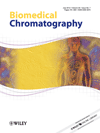
BIOMEDICAL CHROMATOGRAPHY
Transforming Analytical Chemistry for Better HealthBiomedical Chromatography is a prestigious journal published by Wiley, focusing on the vital intersections of analytical chemistry, biochemistry, and clinical studies. With an ISSN of 0269-3879 and E-ISSN of 1099-0801, it has served the research community since its inception in 1986. The journal provides a platform for innovative research in areas such as drug discovery and pharmacology, achieving a commendable placement in Q3 across multiple categories in the 2023 metrics, including Analytical Chemistry and Biochemistry. Although it currently does not offer open access, it plays a crucial role in disseminating scientific developments and methodologies that contribute to advancements in health, safety, and pharmaceuticals. Researchers, professionals, and students can anticipate high-quality, peer-reviewed articles that drive forward the collective knowledge in biomedical applications. Located in the United Kingdom at 111 River St, Hoboken, NJ, the journal continues to attract contributions from global thought leaders in the field.

Analytical Science and Technology
Elevating the standards of analytical chemistry and technology.Analytical Science and Technology is a prominent journal dedicated to advancing the fields of analytical chemistry and technology, published by the Korean Society for Analytical Science. Based in South Korea, this journal serves as a vital platform for researchers, professionals, and students committed to exploring innovative analytical techniques and methodologies. Although it is classified under Q4 in various subject categories, including Agronomy and Crop Science, Environmental Chemistry, and Pharmacology, the journal aims to provide critical insights and contributions to the scientific community. With ISSN 1225-0163 and E-ISSN 2288-8985, it spans a converged timeline from 2019 to 2024. Despite its current standings in Scopus rankings, the journal is dedicated to improving its visibility and impact through rigorous peer review and high-quality publications, fostering knowledge sharing within its diverse academic fields. Researchers looking for a reliable outlet for their findings are encouraged to consider this journal as it continues to strive for excellence in analytical science.
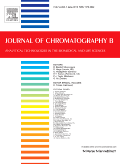
JOURNAL OF CHROMATOGRAPHY B-ANALYTICAL TECHNOLOGIES IN THE BIOMEDICAL AND LIFE SCIENCES
Bridging Disciplines in Biomedical and Analytical ChemistryJOURNAL OF CHROMATOGRAPHY B-ANALYTICAL TECHNOLOGIES IN THE BIOMEDICAL AND LIFE SCIENCES, published by Elsevier, stands as a critical resource in the fields of analytical chemistry, biochemistry, and life sciences. With an impressive convergence of research spanning from 2002 to 2024, this journal delivers high-quality, peer-reviewed articles that advance the methodologies and practices related to chromatographic techniques and their applications in biomedical research. The journal enjoys a reputable standing in the academic community, reflected in its 2023 Scopus rankings—ranked in the 65th and 55th percentiles in Analytical Chemistry and Clinical Biochemistry, respectively. Although it does not offer open access, it provides a vital platform for exchanging innovative ideas and findings, guiding professionals and scholars in addressing the complexities of contemporary biomedical challenges. The journal’s focus on interdisciplinary research positions it as an essential tool for researchers, professionals, and students eager to enhance their knowledge and contribute to advancements in this dynamic field.

Chinese Journal of Chromatography
Fostering Collaboration in the World of Analytical ScienceChinese Journal of Chromatography, published by SCIENCE PRESS, is a dedicated platform for disseminating pioneering research in the fields of Analytical Chemistry, Biochemistry, and Organic Chemistry. Established in 1997, this esteemed journal offers invaluable insights into chromatographic techniques and their applications, showcasing studies that contribute to the advancement of chemical engineering and electrochemistry. Although it currently holds a Q4 ranking in several categories, the journal aims to foster growth and knowledge among researchers, professionals, and students alike. With a continuous publication window extending until 2024, the Chinese Journal of Chromatography invites submissions that not only enhance scientific understanding but also address real-world challenges through innovative chromatographic solutions. Researchers looking for a collaborative community will find this journal a vital resource in their ongoing academic endeavors.